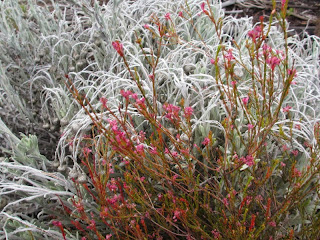Yes! Winter is here! We watched the rain forecast all weekend before deciding to risk walking at our normal time of Sunday afternoon. And we stayed dry!
Before we were off the farm we noticed our tenant has planted a Psoralea pinnata, which is flowering well out of its 'normal' time. We saw another 'in the wild' and it certainly wasn't flowering!
There are still many mushrooms and other fungi to be found. Whether this is a particularly good year for them, or whether we're just more observant, remains to be seen!
These brackets were growing on the full length of a fallen and rotten apple tree stem next door:
A brightly coloured Russula sardonia:
Wouldn't eat this one in a hurry! We were actually looking for the bright red warty ones we had seen in this area before.
Next to the railway line we came across two large patches of these Chasmanthe (aethiopica?):
... and , keeping it in the family, Arum lilies Zantedeschia aethiopica:
Could this be where the expression 'Up a Gum Tree' comes from? I wouldn't like to have to try and climb down!
We decided to walk diagonally across an area which was cleared of large pines about five years ago and again of re-growth recently, to see what's coming up away from the roads. We were very pleased to find another two examples of what we now think is the pale version of Erica coccinea, on a rough North-west / South-east line (our prevailing winds) to the one we have been watching for weeks now, each about 30 metres apart.
Both had been damaged by the tree clearing, but will no doubt survive. I collected a few of the many spent flowers which had spread on the ground below one during the damage.
We were surprised to find a Tritoniopsis still flowering in this area:
We're noticing more and more of what we think is Wild Almond Brabejum stellatifolium:
Although, looking at the flower, we're now not sure!
On the Slangbos, Stoebe plumosa or Seriphium plumosum, the tufts of white on some of the flowers (or buds?) are quite noticeable at the moment:
The first bud of a Helichrysum in 'our' area?
A magnificent Wachendorfia paniculata plant, all we now need is a flower!
There are still pink Ericas around, this one stands out with the white of a Helichrysum behind:
The wind was blowing this Saltera sarcocolla around so much I had to hold it to take a photo!
In the week, Gay mentioned how impressive the mosses are in her garden now. I said we would look out for them.
Walking back through the forest, we found plenty more fungi, Slippery Jack:
Not sure yet what this one is, with rain caught in its cup:
This was on a pine stump:
Close by, on another:
And another!
All this within a couple of kilometres walking from our back door! :-) A
























Well here I go again, too many fungii for me, a few on my breakfast plate is enough. Never the less the walk certainly is of interest if only for some strange points. Arum Lily,Zantedeschia aethiopica, no relation to what we in the UK call Arum Lily, Arum maculatum, yet stangely but for colour an almost identical plant. The Chasmanthe, Saltera and Tritoniopsis are possibly just another flower to you people but to me a joy to see them, so delicate looking and so colourful. The green moss formations interesting, just one question Andy, you show us the flower of the Brabegum but not the one on the Psoralea and it does look nice. Still enjoyed your photos again, you certainly can be a great Fun Guy with that camera..
ReplyDeleteTake heart - there is a shortage of fynbos flowers in winter but the fungus season is a short one!
ReplyDelete